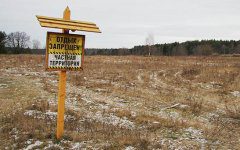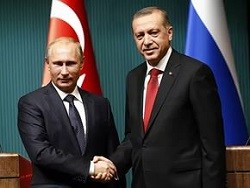
Plans to create a new “KGB” show how Putin, despite a resounding victory in the parliamentary elections, are concerned about their future, experts said.
Vladimir Putin has just secured a large majority in the Russian Parliament. His popularity, judging by the results of public opinion polls is unusually high. It is almost impossible to hear on Russian TV a single critical word about the President. And despite numerous reports of election fraud, there was not the slightest sign of street protests after Sunday’s election.
However, there are many signs that Putin is feeling not as confident as it may seem, if you look at his relaxed behavior and a smile at the appearance in public. The most recent proof of this is the message that he’s going to combine all of their security in something that is very reminiscent of the KGB of the Soviet era.
The new body should include the main security service, the FSB, which, in particular, is responsible for maintaining stable situation in the country, conducting surveillance, public security and the fight against terrorists, foreign intelligence service SVR and the Federal security service, whose main objective is the safety of Putin and other important dignitaries.
The final two services correspond to what is before the collapse of the Soviet Union in 1991 correspond to the First and the Ninth Chief Directorate of the KGB. Even the planned name of the new Russian authority has its old predecessors: the Ministry of state security, the MGB — so from 1946 until the death of Joseph Stalin in 1953 was called the terrible Soviet service, and then received the name of KGB, Committee for State Security.
The Kremlin has not confirmed these plans. But the news was detailed in an article published in the usually well-informed newspaper “Kommersant”, and then in a number of state-controlled Russian media.
Point repression
“I don’t quite understand why, but it is clear that Putin really nervous in the last 8-9 months,” says Andrei Soldatov, head of the Russian analytical services Agentura.ru studying the Russian special services.
“He did a lot of convulsive steps and imposed targeted repression. The impression that the only aim of Putin is to send a signal to its elite and its bureaucratic apparatus about to be on their guard and to maintain discipline,” he says.
Another example of nervousness is the creation of the national guard of 400 thousand people, which reports directly to the President and shall, in particular, be used to quell the unrest. As a third example might be the appointment of a number of high-ranking officers of the security service governors throughout Russia. The fourth example is the dismissal of some heads of the security services.
“Putin is concerned about much more than we expected,” says one of the leading experts on Russia, mark Galeotti (Mark Galeotti), which specialises in security of the country.
“KGB room 2 would be a powerful tool not only to suppress any potential opposition, but also to monitor the elite and its tame” — said Galeotti, senior research fellow, Institute of International Relations in Prague.
Growing economic protests
Sunday’s elections were a triumph for Putin’s party “United Russia”. But historically small turnout of voters (only 48%) and numerous examples of election fraud stress, according to Galeotti, Putin does not have the legitimacy, which was with him a few years ago when the economy was constantly in good condition, and ordinary Russian citizens lived better than ever before.
Now the country is in crisis, and in the past year, the government apparently was forced to adopt new austerity plans. Likely raised the retirement age. Real wages fell sharply. One-sixth of Russians live below the official poverty level. Many businesses reduce production, reduce working time of their employees and the delayed issuance of salary or do not pay it. Strikes and other forms of protest have become more common.
The Russian Center for Economic and policy Research in its latest “crisis report” talked about 56 strikes and other economic protests in the country in the second quarter. 12 protests more than in the first quarter of this year.
In the last two weeks of August the miners of the South of the Rostov region held a hunger strike in protest against unpaid wages. Farmers in Krasnodar region went to Moscow in protest against the fact that large agricultural corporations Rob them of their land. But angry workers of enterprises producing cars in Samara, blocked the highway, because they were not paid a salary.
…which can become political
The protests are spreading, although they were not particularly large and was not for political reasons. On the contrary, many of the protesters of the group emphasized that they do not want a revolution like in Ukraine in 2014, and many are turning to Putin with a request to help them when denied this, local authorities and the courts.
But all this could change quickly if continued economic crisis, says sociologist Denis Volkov of the Russian independent analytical Levada-center. In this case, Putin exposed a much higher risk than after the previous parliamentary elections in 2011, when there were mass demonstrations of protest against the rigging of these elections.
“Everything indicates that the effect of the Crimea will soon end and that we are entering a period of growing discontent. Who knows what can come of this, but maybe the government even with nostalgia will remember the peaceful protests of 2011,” said Volkov in an interview with Novaya Gazeta.
State-controlled television channels are constantly reporting how the opposition allegedly in Kiev is preparing a “coup d’etat”. A few weeks ago, the channel REN TV showed a documentary program, filmed using a hidden camera, maybe biased, but nonetheless documented showing the connection between the liberal opposition and the Russian ultra—nationalists.
Billionaire Putin critic Mikhail Khodorkovsky predicted from his exile in London that Russia is on the brink of revolution. And Vyacheslav Maltsev, a nationalist blogger, who, to the surprise of many, took one of the top lines in the party list of the liberal party Parnas in the elections to the Duma, even set a date when you can expect a similar revolution: November 5, 2017, the day after the annual March of nationalists in Moscow.
A new kind of Putinism
Many still believe that the Ukrainian scenario is unlikely in Russia. But events such as the planned revival of the KGB/MGB show that Putin does not intend to take risks.
“The FSB offers from time to time because for her it is about Empire building. Putin had previously slowed down is for two reasons: as a veteran of the KGB and FSB, he realizes that this will give the service more power, maybe even too much. But also because, in his opinion, it was not necessary,” says mark Galeotti.
Researcher calls almost 17 years of being Putin’s government is “democratic performance, under cover of which his authoritarian regime can continue.”
“But he increasingly feels he is under pressure, and therefore creates institutions to more stringent authoritarian rule, if necessary. This does not mean that it will necessarily be to govern the country as being an authoritarian figure. But it creates structure to be able to do it. The old “Putinism” is nearing decay, so that the Foundation for potential new Putinism,” says mark Galeotti.
Putin is risking to face a “hidden coup”
No mark Galeotti, nor Andrei Soldatov does not believe that joint service security will become so strong that it would represent any danger for Putin himself. After all, the former KGB officer and former head of the FSB very good control of his former colleagues, and, in addition, Russia’s Armed Forces will continue to be a good counterweight.
But it may be that the new body will have even more power than the KGB, which was under the supervision of higher institutions of the Communist party. And the intelligence that gets on the table to Putin, can be even more sorted and distorted than the current information.
“An ordinary coup is unlikely,” — says mark Galeotti.
“However, Putin runs the risk of a hidden political coup, when he will be the President and will believe that he holds the power in their hands, but in reality they are manipulating its security and their control over the information that he will receive,” — says a British researcher.
Galeotti believes “extremely alarming” and “a complete lack of ability to discern the nuances of” a possible decision to return to the title of the MGB, which is clearly associated with Stalin. Andrei Soldatov says that the problem lies not only in these three letters, but also in the creation of the Institute under the name of “national security”.
“It turns out that the concern is the security of the regime, not the people, and this is demonstrated quite openly,” says Soldatov.








